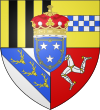Ralph Murray
| Sir Ralph Murray | |
|---|---|

Murray family arms
|
|
| Born |
Francis Ralph Hay Murray 3 March 1908 |
| Died | 11 September 1983 (aged 75) |
| Nationality |
|
| Education | Brentwood School |
| Alma mater | St Edmund Hall, Oxford |
| Occupation | Journalist, diplomat |
| Title | Director, Information Research Department (1949–54) British Minister, Cairo (1954-56) British Ambassador to Greece (1962–67) Governor of the BBC (1967–83) |
| Spouse(s) | Mauricette Vladimira Marie, Reichsgräfin von Kuenburg |
| Children | Ingram, Nicholas, Georgina and Simon |
| Parent(s) | Revd. Charles Murray & Mabel Umfreville |
| Relatives | Al Murray (grandson) |
| Awards |
Knight Commander of the Order of St Michael and St George Companion of the Order of the Bath |
Sir Francis Ralph Hay Murray KCMG CB (3 March 1908 – 11 September 1983), was a British journalist, radio broadcaster and diplomat.
A great-great-great grandson of John Murray, 3rd Duke of Atholl, he was the son of the Revd Charles Murray, Rector of Kirby Knowle, Yorkshire, by his wife Mabel (née Umfreville). His great-grandfather was the Rt Revd Dr George Murray, Bishop of Rochester (who married Lady Sarah Hay-Drummond), while the actor Stephen Murray was his younger brother and both were proud members of Clan Murray. He was educated at Brentwood School and St Edmund Hall, Oxford. His father died in 1919 from the Spanish flu pandemic.
Murray was a talented linguist, he spoke many languages fluently including French, German, Italian, Spanish, Greek, and some Russian. Before the Second World War he worked for the BBC as a journalist, having previously worked for a Bristol newspaper. In 1935 he reported the Saarland Plebiscite – and succeeded in broadcasting live during the 9 o'clock news holding a microphone out of the window to capture the chants of the mob – a major technical feat, and possibly the first time an international live outside broadcast had been undertaken. In common with many on the periphery of Special Operations Executive (SOE), knowledge of his wartime service is hazy. He was most closely associated with propaganda, and from 1941 was a member of the Underground Propaganda Committee (UPC) which had been formed to fuel a whispering campaign to undermine any invasion. He was also associated with Bletchley Park, and was involved in supporting resistance activity, notably, from 1943, of the Yugoslavian Partisans where he met Josip Broz Tito. His wife Mauricette was involved in propaganda broadcasting to occupied Europe, notably to Sweden where she had spent several years as a child.
...
Wikipedia
